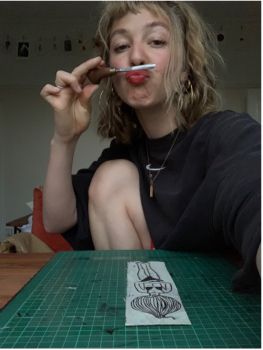SHL News
Daisy Stewart-Darling, Sussex Digital Humanities Lab & The Living Coast Artist in Residence 2024
By: Elena Dennison
Last updated: Friday, 10 May 2024

Daisy Stewart-Darling, Artist in Residence 2024
Earlier this year the Sussex Digital Humanities Lab teaming up with The Living Coast, ONCA and Fabrica, invited proposals from early career artists to research, develop and exhibit new work under the theme of Multispecies Flourishing.
Daisy Stewart-Darling was selected amongst a large number of very high-quality proposals from artists across the South East of England.
We had a chat with Daisy and asked her about her work and plans for this residency.
What being selected for the residency meant to you?
Having this opportunity has been a tangible encouragement for me. I graduated mid 2021 when we were all just emerging from the pandemic. Specifically, as someone who’d been studying a creative subject, finding/ figuring out how to move forward in such a time of uncertainty for the industry was really daunting.
Between then and now, I picked up labouring and hospitality work to support myself, and continued to self-study and develop my artistic practice as much as I could, while researching into exhibiting sound installations and applying for funds. It has been a really steep learning curve, especially coming from a music tech background where my knowledge of how the art world worked was pretty limited. This also felt quite risky, as the area I’ve been driven to pursue has been centred around sound ecology, a lesser-known area outside academic circles.
“Overall, I'm excited to develop this next stage of exploring the intersection between sound ecology, arts platforms, and plant materiality as a means to build better relationships and understandings between us within our ecosystems.”
I’ve been challenged to trust my instincts and stick to it which has felt like swimming again the tide most the time. Despite all this, each exhibition has led to the next and to the continued development of my artistic identity which seems to be fulfilling the role of connecting people in a meaningful way to the environment, through listening via artistic platforms. So, I’ve kind of been riding that wave.
It’s meant a lot for me being awarded the SHL Digital & Living Coast Residency. It has come at a time where I feel really equipped from developing my practice, understanding how to connect with people in an arts context, and sharing all the research I’ve been doing into sound and ecology to do a good job and take my work up to the next level. It is such a privilege.
What do you plan to do?
For this next chapter, I'm building upon previous installations, with the main concept centering around interactive lino pieces of sites of sonic importance from across the biosphere. The concept is inspired by the work of Japan's 100 sites, listed in 1966, which has resulted in these sites being protected until present day through ecotourism/ building a relationship between the public and these environments.
I've found a level of interactivity and invitation to 'play' a really effective form of communicating with people, utilising the arts platform in an accessible way for a diverse audience. My previous work has also been building on integrating lino visuals which people have seemed to respond well to.
Using lino as an interface is also significant. The lino I use is made from plants, notably linseed which is the oldest cultivated plant we have on record. In choosing to work with this material, I hope to further illustrate plants as creative partners, which is relevant when exploring building relationships with the environment in platform non-human voices not only sonically (though the field recordings of these environments used within the sound installations), but also drawing attention to the visible materiality of the work itself. I've also never seen lino used this way, so I'm having fun exploring how to work with it in an innovative new way.
Daisy’s residency work will be exhibited at ONCA gallery, 14 St George’s Place, Brighton, BN1 4GB, from 19th until Sunday 27th June (1:30pm – 5:30pm).